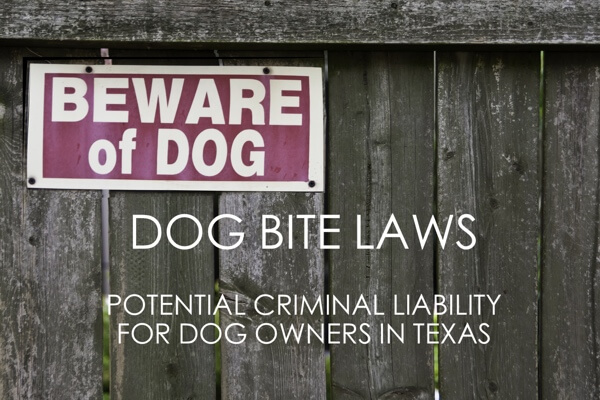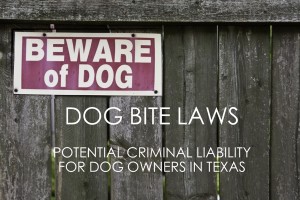
Texas Law Regarding Dog Owners and Dog Attacks
 Believe it or not, a person could be criminally liable, meaning they could be convicted of a crime, if their dog attacks someone. Texas appellate courts have recently upheld Texas’ dog bite law, also known as Lillian’s Law. Therefore, it is important to be aware of what is required of you as a dog owner. The article below outlines Texas law as it relates to dog owner responsibility. If you own a dog that has displayed dangerous tendencies, you should take a look.
Believe it or not, a person could be criminally liable, meaning they could be convicted of a crime, if their dog attacks someone. Texas appellate courts have recently upheld Texas’ dog bite law, also known as Lillian’s Law. Therefore, it is important to be aware of what is required of you as a dog owner. The article below outlines Texas law as it relates to dog owner responsibility. If you own a dog that has displayed dangerous tendencies, you should take a look.
Can I be Convicted of a Crime in Texas if My Dog Attacks Someone?
Yes. In Texas, you can be convicted of a felony offense if your dog attacks and injures someone. There are two instances in which a dog owner can be convicted of a criminal offense for a dog attack:
- If, with criminal negligence as defined by §6.03 of the Penal Code, they fail to secure the dog and the dog, in a place other than the owner’s real property, boat, or motor vehicle, makes an unprovoked attack on another person that causes serious bodily injury or death; and
- If they know their dog is a dangerous dog by receiving notice in a manner described in the Texas Health & Safety Code, and the dog, in a place other than the owner’s real property, boat, or motor vehicle, makes an unprovoked attack on another person that causes serious bodily injury or death.
The offense is a third degree felony, which is punishable by 2-10 years in prison and a fine of up to $10,000. If the attack causes death, then it’s a second degree felony punishable by 2-20 years in prison and a fine of up to $10,000.
How do I know if my dog is considered a “Dangerous Dog” under Texas law?
Under the Texas Health and Safety Code, a “dangerous dog” is a dog that makes (1) an unprovoked attack on a person that causes bodily injury or death or (2) commits unprovoked acts leading a reasonable person to believe that the dog will attack them in a place other than an enclosure reasonably certain to prevent escape by the dog.
The law recognizes 3 ways for you to learn that your dog is considered a “dangerous dog”:
- You know your dog has attacked someone;
- You received notice from the court that they have found the dog to be a “dangerous dog;” or
- Animal control informed you that the dog is a “dangerous dog.”
What are my requirements if I know my dog is a “Dangerous Dog”?
Within 30 days after a person is informed that they are the owner of a dangerous dog, the person must:
- Register the dog with animal control authority for that area;
- Restrain the dog in a secure enclosure* or on a leash in the immediate control of a person;
- Be able to show financial responsibility of at least $100,000 to cover any damages from an attack (i.e. liability insurance coverage of at least $100,000);
- Comply with any local regulation, requirements, or restriction.
*A secure enclosure means a “fenced area or structure that is”
- Locked;
- Capable of preventing the entry of the general public, including children;
- Capable of preventing the dog from leaving on its own;
- Clearly marked as containing a dangerous do; and
- In compliance with the enclosure requirements established by the local animal control.
What Defenses are Available if I Have Been Charged With the Dog Bite Statute?
A person has a defense to criminal liability for a dog bite case if:
- The person is a veterinarian, veterinary clinic employee, a peace officer, employee of a recognized animal shelter, dog trainer/employee of a guard dog company, or a person employed by the state or the state’s political division to deal with stray animals AND has temporary ownership, custody, or control of the dog in connection with their position.
- The person is employed by the Texas Department of Criminal Justice or other law enforcement agency and is training or using the dog in connection at the time of the attack.
- The person has a disability, the dog is trained to provide assistance to a person with a disability, and the person is using the dog to provide assistance in connection with their disability.
- The person attacked was in the process of committing a homicide, kidnapping, trafficking of a person, sexual offense, assaultive offense, any property damage or destruction, robbery, burglary, or criminal trespass.
- At the time of attack, the dog was on a leash and the person was in immediate control of the dog OR if not, the person was making immediate and reasonable attempts to regain control.
A person has an affirmative defense if, at the time of attack,:
- The person and the dog are participating in an organized search and rescue effort at the request of law enforcement.
- The person and the dog are participating in an organized dog show/event sponsored by a recognized kennel club.
- The person and the dog are participating in a lawful hunting activity or farming/ranching activity.
Tarrant County Animal Control Links
If you need to register your dog with animal control or if you need to ask more questions after reading this article, below are the links to some local animal control offices in Tarrant County:


 The Texas Attack By Dog Statute (
The Texas Attack By Dog Statute (





